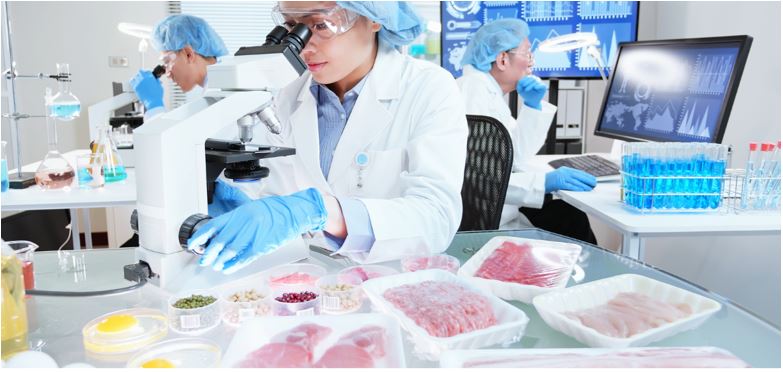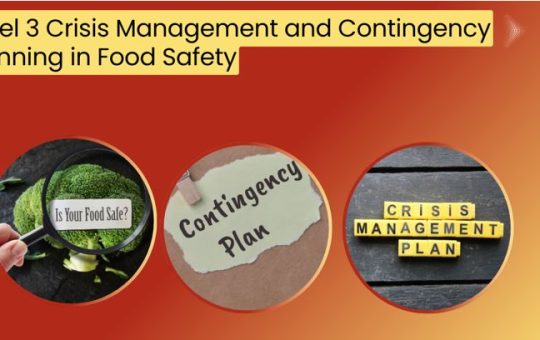
Level 4 Award in Managing Food Safety in Catering
Level 4 Award in Managing Food Safety in Catering
Course Overview
The Level 4 Award in Managing Food Safety in Catering is a highly advanced qualification designed for individuals who are responsible for managing food safety within catering environments, including restaurants, hotels, and food service establishments. This qualification is ideal for food safety managers, supervisors, and business owners who seek to enhance their ability to implement and manage food safety systems effectively, ensuring compliance with the highest food safety standards and regulations. The course focuses on the development and management of food safety systems, including risk assessments, HACCP (Hazard Analysis Critical Control Point), and hygiene practices.
Benefits
- Advanced Management Skills: Develop advanced skills in managing food safety systems, policies, and procedures in catering businesses.
- Compliance Expertise: Gain a thorough understanding of relevant food safety legislation, ensuring that your business complies with all legal requirements.
- Enhanced Leadership: Learn how to lead and motivate teams to uphold high food safety standards, while also managing training and development programs for staff.
- Risk Management: Understand how to assess, control, and mitigate food safety risks, ensuring the safety of customers and staff.
- Career Advancement: The qualification opens up opportunities for senior managerial roles in the food industry, such as food safety manager or consultant.
Learning Outcomes
Upon successful completion of the course, learners will be able to:
- Understand the principles of food safety management and legislation as it applies to the catering industry.
- Implement and manage effective food safety management systems, including HACCP, to control food safety risks.
- Conduct detailed risk assessments and develop strategies to mitigate foodborne hazards.
- Lead food safety teams and manage food safety audits and inspections.
- Design, implement, and manage food safety training programs for staff.
- Identify and apply advanced control measures for food safety, including temperature control, cleaning and sanitation, and storage.
- Supervise the management of food allergens, labeling, and packaging requirements.
- Monitor and evaluate the effectiveness of food safety practices and make improvements where necessary.
Study Units
Unit 1: Food Safety Legislation and Standards
- Overview of national and international food safety regulations and standards.
- Understanding food safety law and the roles of regulatory bodies.
- Implementing policies to ensure compliance with food safety regulations in a catering environment.
Unit 2: Food Safety Management Systems (FSMS)
- Introduction to food safety management systems (FSMS) and HACCP.
- Developing, implementing, and managing FSMS to ensure food safety compliance.
- Integrating FSMS into day-to-day food operations and practices.
Unit 3: Risk Assessment and Hazard Control
- Identifying food safety risks and conducting detailed risk assessments.
- Applying the principles of HACCP to assess and control foodborne hazards.
- Implementing control measures to mitigate risks such as cross-contamination, temperature abuse, and poor hygiene.
Unit 4: Leadership and Management of Food Safety
- Leading food safety teams and managing compliance with food safety policies.
- Developing food safety culture and promoting staff accountability for food safety.
- Leading training initiatives and motivating staff to maintain high standards of hygiene and safety.
Unit 5: Advanced Food Safety Practices
- Implementing advanced practices for controlling foodborne pathogens, allergens, and cross-contamination.
- Ensuring proper cleaning, sanitizing, and waste management practices in food preparation areas.
- Managing food storage, temperature control, and product handling to ensure food safety.
Unit 6: Monitoring and Auditing Food Safety Systems
- Developing and conducting internal audits and inspections to evaluate food safety practices.
- Managing and responding to external audits and regulatory inspections.
- Using audit results to make improvements in food safety management.
Unit 7: Food Allergen Management
- Identifying and managing allergens in food preparation and serving.
- Implementing allergen management systems and ensuring staff awareness and training.
- Complying with labeling and packaging requirements for allergens.
Unit 8: Emergency and Crisis Management
- Developing food safety contingency plans for emergencies, including foodborne illness outbreaks.
- Responding effectively to food safety incidents, including contamination events and recalls.
- Ensuring that your food safety management systems are resilient in the face of emergencies.
Career Progression
The Level 4 Award in Managing Food Safety in Catering is a key qualification for those seeking senior roles in food safety management and consultancy. Career opportunities include:
- Food Safety Manager: Oversee food safety practices across catering operations, ensuring compliance and implementing safety systems.
- Catering Manager: Manage food safety systems within restaurants, hotels, and food service establishments.
- Food Safety Consultant: Provide expert advice and guidance to businesses on food safety practices and regulations.
- Health and Safety Manager (Catering): Take responsibility for ensuring health and safety policies are adhered to in food-related environments.
- Quality Assurance Manager: Ensure that food quality and safety standards are maintained throughout the catering operation.
- Food Safety Auditor: Perform audits of food safety systems to evaluate compliance and identify areas for improvement.
- Training and Development Manager: Manage food safety training programs to educate staff on best practices and regulations.
This qualification also serves as a foundation for pursuing higher-level qualifications and specialized roles within the food industry, such as food hygiene consultant or public health food safety expert.
Our assessment process is designed to ensure every learner achieves the required level of knowledge, skills, and understanding outlined in each course unit.
Purpose of Assessment
Assessment helps measure how well a learner has met the learning outcomes. It ensures consistency, quality, and fairness across all learners.
What Learners Need to Do
Learners must provide clear evidence that shows they have met all the learning outcomes and assessment criteria for each unit. This evidence can take different forms depending on the course and type of learning.
Types of Acceptable Evidence
Assignments, reports, or projects
Worksheets or written tasks
Portfolios of practical work
Answers to oral or written questions
Test or exam papers
Understanding the Structure
Learning outcomes explain what learners should know, understand, or be able to do.
Assessment criteria set the standard learners must meet to achieve each learning outcome.
Assessment Guidelines
All assessment must be authentic, current, and relevant to the unit.
Evidence must match each assessment criterion clearly.
Plagiarism or copied work is not accepted.
All learners must complete assessments within the given timelines.
Where applicable, assessments may be reviewed or verified by internal or external quality assurers.
Full learning outcomes and assessment criteria for each qualification are available from page 8 of the course handbook.
Top Courses
No results found.
Related Courses
Let's Get in touch
Deleting Course Review
Course Access
This course is password protected. To access it please enter your password below:



